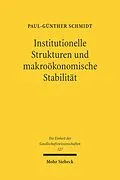In a cross-national comparative analysis of central banks, exchange rate regimes, banking sectors, political systems and labor market relations in 47 democracies during the last quarter of the twentieth century, Paul-Günther Schmidt delivers strong empirical support for the basic message of his book that the roots of macroeconomic instability are deeply embedded in adverse and harmful features of the economic and political system of nations.
In view of chronic inflation and mass unemployment in many countries around the world, this book addresses the question of how and under which circumstances a higher degree of economic stability could be achieved. Paul-Günther Schmidt presents a "post-monetarist" theory drawing special attention to a variety of institutional factors that condition the macroeconomic performance of a market economy in the long run. In a cross-national empirical analysis of central banks, exchange rate regimes, banking sectors, political systems and labor market relations in 47 democracies during the last quarter of the twentieth century, the author delivers strong empirical support for the basic message of his book: in the long run the degree of macroeconomic stability is conditioned by the institutional architecture of the national economic and political system.
Autorentext
Geboren 1954; Studium der Wirtschafts- und Sozialwissenschaften, der Statistik und der Politischen Wissenschaft in Dortmund und Mainz; 1984 Promotion und 2001 Habilitation in Mainz, seit 2004 Professor für Volkswirtschaftslehre und Leiter des Centre for Financial Economics an der Wissenschaftlichen Hochschule der Bankakademie in Frankfurt am Main.
In view of chronic inflation and mass unemployment in many countries around the world, this book addresses the question of how and under which circumstances a higher degree of economic stability could be achieved. Paul-Günther Schmidt presents a "post-monetarist" theory drawing special attention to a variety of institutional factors that condition the macroeconomic performance of a market economy in the long run. In a cross-national empirical analysis of central banks, exchange rate regimes, banking sectors, political systems and labor market relations in 47 democracies during the last quarter of the twentieth century, the author delivers strong empirical support for the basic message of his book: in the long run the degree of macroeconomic stability is conditioned by the institutional architecture of the national economic and political system.
Autorentext
Geboren 1954; Studium der Wirtschafts- und Sozialwissenschaften, der Statistik und der Politischen Wissenschaft in Dortmund und Mainz; 1984 Promotion und 2001 Habilitation in Mainz, seit 2004 Professor für Volkswirtschaftslehre und Leiter des Centre for Financial Economics an der Wissenschaftlichen Hochschule der Bankakademie in Frankfurt am Main.
Titel
Institutionelle Strukturen und makroökonomische Stabilität
Untertitel
Eine international vergleichende Analyse
Autor
EAN
9783161628542
Format
E-Book (pdf)
Hersteller
Genre
Veröffentlichung
01.07.2024
Digitaler Kopierschutz
Adobe-DRM
Dateigrösse
81.23 MB
Anzahl Seiten
803
Unerwartete Verzögerung
Ups, ein Fehler ist aufgetreten. Bitte versuchen Sie es später noch einmal.
